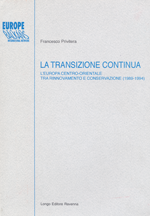and Balkan Europe
by IECOB & AIS Università di Bologna

This area collects information about a wide range of books, monographies and edited volumes concerning the countries and themes relevant to PECOB
The transition continues
Central-Eastern Europe between renewal and preservation (1989-1994) (in Italian)
by: Francesco Privitera
original title: La Transizione Continua - L'Europa Centro-Orientale tra Rinnovamento e Conservazione
published by: A. Longo editore
pp: 160
ISBN: 88-8063-080-6
price: € 14.46

The transition from communism to post-communism which occurred in eastern Europe – and in a different way also in western Europe – is turning out to be one of history’s greatest «turning points» and will influence human destiny for some time to come.
It is from this perspective that some of the most important processes of the political-social, judicial-economic and historic-cultural transformation underway in central-eastern Europe (ie the area politically formed by Hungary, the Czech Republic, Slovakia and Slovenia) have been analyzed in an attempt to focus on the distinctive traits that characterize each region.
Is this actually a profound change of these societies, or is it just the ruling classes’ adaptation to the need to reorient their economies? What kind of market has actually been introduced in these countries, and how? How has privatization changed the socio-economic order? To what extent was public opinion involved in the transition? And how are civil societies evolving? What is the link between nationalism and modernization?
What this book offers is a panorama of the «transition» in a part of Europe that is particularly important due to its geographic position as a «bridge» between West and East and which, in spite of many contradictions, has appeared to be able to fully convert to a market economy. However, two important questions remain unanswered: how can the European Union, confronted with a profound cultural crisis triggered by its incapacity to deal with the Yugoslav crisis, encompass countries and peoples from the East it finds hard to consider as culturally European? And what can these countries, formed in the shadow of a «new» nationalism, contribute to European integration?
Table of contents
Preface by Rudolf Rizman
Introduction
Chapter one
The transition in Hungary: gradualism and reform
Chapter two
The Hungarian economy on the way to the market
Chapter three
Czechoslovakia between transition and disintegration
Chapter four
Transition to the market in Bohemia, Moravia and Slovakia
Chapter five
Slovenia’s escape from the Balkans: aspects of political transition
Chapter six
In search of lost wellbeing: Slovenia on the way to the market
Conclusion
Europe to come: some reflections
Appendices
Tables








